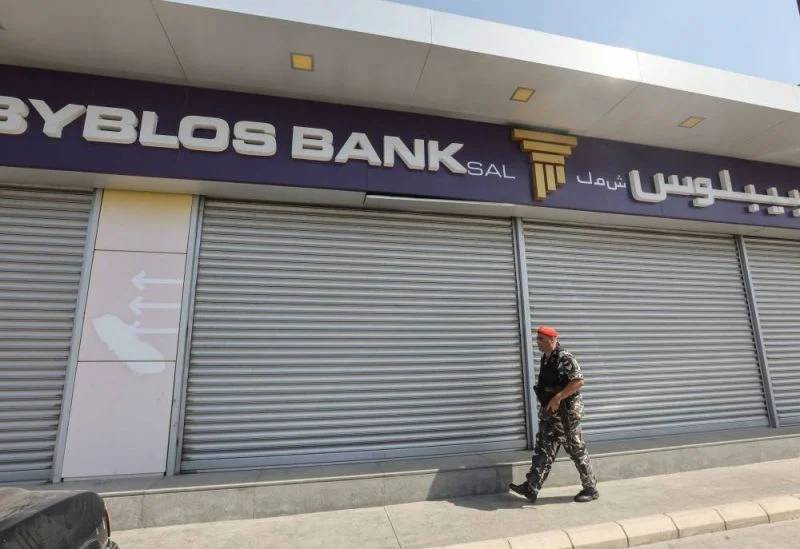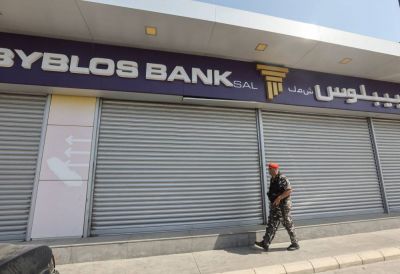
The Byblos Bank branch in Sour, which was targeted by a depositor yesterday. (Credit: Aziz Taher/Reuters)
Yesterday was as hectic as the day before for the Lebanese banks. As promised by the Mouttahidoun collective on Monday [Oct.3], depositors took action in several bank branches in the country in a bid to retrieve their money stuck in the banks due to unilateral restrictions that the banks have imposed since the beginning of the crisis.
The first holdup took place in a branch of the Lebanese Bank for Commerce (BLC) in Chtaura, in the Bekaa, of which the bank later vowed it would transfer $4,300. The second incident unfolded in a branch of the First National Bank (FNB) in Tripoli, North Lebanon, and a third in a Byblos Bank branch in Sour.
In Hazmieh, in the suburbs of Beirut, a man organized a sit-in at a branch of Intercontinental Bank of Lebanon (IBL) in an attempt to claim part of his savings.
This new wave comes almost two weeks after a series of seven holdups organized by other depositors in 72 hours, prompting all banks to close their branches, before they reopen amid strict capacity to customers. The depositors’ association reiterated in a statement the call to form a crisis cell so as to find a solution as soon as possible, otherwise it will continue to support actions similar to those carried out in the past two days.
ABL, which had remained silent since the beginning of the week, finally published a Tuesday statement to contextualize what it perceives as its responsibility in the crisis the country is going through since 2019. ABL added that depositors’ anger should be directed toward state institutions, especially Banque du Liban, which it deemed more responsible.
Squandered money
ABL argued in particular that the state and BDL helped “squandering” the depositors’ money, indicating that the state had withdrawn from BDL no less than $62.67 billion until “June 21, 2022,” which was largely spent on the stabilization of the rate of the Lebanese lira for more than two decades, high interest rates, or the advances of the Treasury to Electricité du Liban whose rates have been frozen since 1994.
“Could the banks have opposed the financial and monetary policies decided by the state and the BDL?” ABL also asked in its statement, which it responded to by saying the banks had been forced to deposit foreign currencies into BDL and that their freedom to invest abroad was limited by regulations.
“This last point is valid,” said a financial source who declined to be named for professional reasons. The source explained, for example, that BDL does not allow banks to invest more than 50 percent of their capital in foreign bonds, among other limits.
The ABL then said in its statement that state authorities and BDL had the means to limit the crisis’ consequences at its onset, by adopting a law establishing formal capital controls.
In this regard, ABL pointed out that foreign exchange reserves have fallen from $33 billion at the end of 2019 to “around” $10 billion today — a number that is difficult to verify given BDL’s lack of transparency in this area.
Greed
According to Fouad Debs, a lawyer, co-founder and a member of the Depositors’ Union, one of the organizations that defends customers harmed by their banks, ABL’s statement is “simplistic.”
He explained on the other hand, that greed, more than the constraint imposed by the regulations, is what pushed some banks to deposit “more than 80 percent” of their deposits with BDL by buying in particular treasury bills in lira and eurobonds in dollars, or even deposit money with BDL “instead of the corresponding banks in order to benefit from high interest rates and distribute dividends and bonuses not even seen by European bankers.”
The financial source backed this interpretation, and added that “when some banks agree to invest their money with BDL to benefit from high interest rates, the other banks have no choice but to follow in their footsteps, so as not to be left behind.” In sum, the high returns on investments with BDL allowed banks to offer higher interest rates to attract deposits.
The lawyer also indicated that the banking sector is closely linked to the current or former ruling class — some of its members are shareholders or members of the boards of directors of several banking institutions. “Therefore, it is a shared responsibility,” he said.
The lawyer also pointed out that Prime Minister-designate Najib Mikati was quick to state that the new official exchange rate of LL15,000 to the US dollar which the country would roll out gradually, will not apply to the banks’ balance sheets, avoiding the risk that “a large part” of them would go bankrupt.
While Debs acknowledges the validity of ABL’s argument that the situation could have been contained had a law establishing formal capital controls been quickly adopted, he said that some of the banks’ bosses also took advantage of the lack of regulations to transfer their money abroad. Politically exposed persons took advantage of that, he said, but did not name them. According to him, the banks themselves have refused any fair and comprehensive capital control law so that they continue to apply discretionary measures since the crisis broke out.
The crisis that Lebanon has been going through is ranked one of the worst the world has seen since the 1850s, according to the World Bank. The World Bank criticized the ruling class for deliberately allowing the situation to worsen, which has caused the burden of the adjustments made to fall on the middle class and poorer Lebanese. During a brief visit to Beirut two weeks ago, the International Monetary Fund expressed its annoyance at the lack of progress in implementing the reforms agreed upon under the April staff-level agreement.
This article was originally published in French in L'Orient-Le Jour. Translation by Joelle El Khoury.
